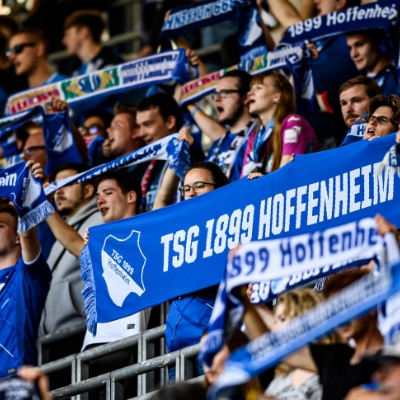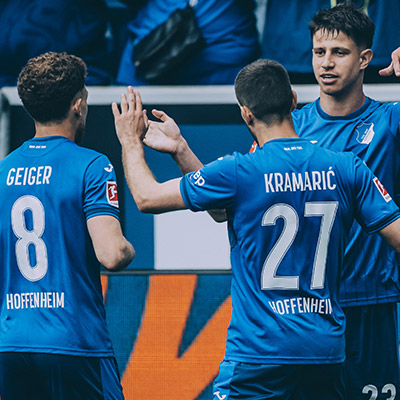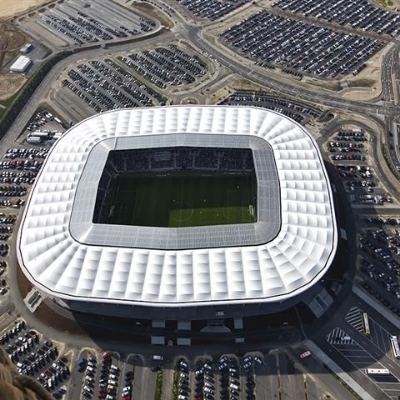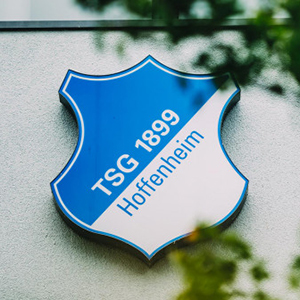Briel: "This success cannot be overestimated"
Mr. Briel, the team finished in sixth place and qualified automatically for the group stages of the UEFA Europa League courtesy of a strong finish and a 4-0 victory in Dortmund on the final day of the season. What are your thoughts and feelings on the 2019/20 season?
"It was a wonderful, fantastic success. The Bundesliga is a tough competition and reaching the UEFA Europa League ahead of competitors who, in some cases, are financially stronger certainly cannot be taken for granted for TSG Hoffenheim and is a wonderful confirmation of the ambitious work that has been done at our club in recent years. The fact that we additionally managed to jump from seventh to sixth place on the final matchday is the result of an outstanding performance from our team, the coaching team and the entire club. Matthias Kaltenbach, Marcel Rapp, Kai Herdling, Michael Rechner and Timo Gross have, under Alexander Rosen's leadership, given the team renewed energy in the last four games and have once again made the team play an offensive, courageous and attractive brand of football. But I'd like to emphasise that Alfred Schreuder is a big part of the success of the whole season too. He took over the team in extraordinary circumstances, which were shaped by the biggest upheaval in our recent past and later by the corona crisis. In addition, two absolutely exceptional players from the previous season, Andrej Kramarić and Ishak Belfodil, were not available to him in the long term due to injury. He led the team to seventh place and ultimately did not leave due to a lack of success. Alfred can look back on a good job.
TSG Hoffenheim achieved a higher finish than they managed in the previous season under Julian Nagelsmann. They lost 4-2 in Mainz on the final day of that campaign and dropped down to ninth place in the table.
"This also constitutes a certain development for us. We had three years with Julian, the most talented young coach in Germany, who was synonymous with TSG's recent success story and had a decisive influence on the way the team played – it was a fantastic time. But after his departure before the season, we said that we now needed to move on. In the end we were very successful, especially considering that we were able to generate record transfer revenue following the departure of numerous key players in the summer; but at the same time, we had to give the squad a new structure. Many had predicted a slump for us. But we've shown that we've taken another step forward in our development process."
Places 8 to 12 always used to be set as a realistic objective...
"Today, we are ranked between 7th and 10th in terms of financial strength. We've managed to work our way up a little, although it would be very difficult to further improve our financial position. But the good thing is that although the financial aspect is a very important parameter, it is by no means the only factor for success. We always stress that we work according to the maximum principle of business management: we try to achieve as much as we can from the given resources."
"THIS SUCCESS CANNOT BE OVERESTIMATED"
This approach has culminated in qualification for the UEFA Europa League this season...
"Alexander Rosen was right to emphasise that this success cannot be overestimated. We managed sixth place with a predominantly new set-up; we coped excellently with setbacks in the form of many long-term injuries to key players and with a season that has been extraordinary on account of the corona pandemic."
For a long time, it was uncertain and even controversial that the season could be finished at all. The German Football League (DFL) and Bundesliga clubs were dealt some harsh criticism about the fact that football was virtually the first industry to press for the right to resume operations.
"I can understand, especially if you're looking at it emotionally from the outside, that you may have some criticisms relating to the development of what are sometimes absurd sums on the transfer market and in the remuneration structure. As football, we're obviously vulnerable because we simply work with incredibly large sums of money, and a large bubble has developed in some cases. But to my mind the focus has been excessively narrowed to the football-playing millionaire who is set to continue to receive his salary. Few people have understood or wanted to understand that beyond this there are just under 60,000 jobs with which absolute average earners feed their families. Because football was the first industry to try to restart its operations during a critical pandemic phase, it was looked upon with suspicion and sometimes false allegations were made."
And then the DFL actually got the concept for a "special match operations" approved. Despite initial doubts as to whether it could work that way, it did work.
"This concept was basically a life insurance for some clubs, and for football as a whole it was extremely important. When the season was suspended in mid-March, it was completely uncertain whether we'd even be able to play Bundesliga football again this year. At some point we all knew that we could only play again together if we got used to these things, i.e. partial quarantine, testing every three days, disinfection, distancing, face masks. At first this almost seemed like an eerie, surreal idea to implement. But these were not any old rules and regulations that we wanted to implement casually. We were aware that the approval had placed us in a privileged situation. The concept was subsequently adhered to extremely stringently and meticulously, even once restrictions in other areas had long since been eased. That was key to the success too."
"WE'LL EXCEED THE EUR 200 MILLION TURNOVER THRESHOLD"
The concept came with a high price to pay: no spectators were allowed in the stadiums. In the autumn of 2019, you announced in an interview with SPIELFELD that the 2019/20 season would culminate in another record financial result. Will this remain so despite the lower revenues?
"TSG Hoffenheim is also feeling the effects of corona. We're suffering significant losses in turnover. We've had to play home matches without spectators and have received less TV money than planned. Nevertheless, the 2019/2020 season will remain a record season, especially given that by the time the season was interrupted, we'd already completed almost three quarters of the season and were able to finish it in the end. We'll exceed the EUR 200 million turnover threshold, driven of course by the high transfer revenues of more than EUR 110 million last summer.
Can you estimate how much lower the turnover will be compared to your calculation last autumn? In other words, how much of a financial loss will be caused by the corona pandemic?
"That can already be quantified. For the current season it's about five percent, and in the coming seasons it'll be considerably more."
There were also cuts to the DFL's current contracts with the TV rights holders. In addition the income from the new contract, which starts in 2021/22, is lower. What kind of revenue shortfall will this result in for TSG?
"Based on the original planning scenario for media revenue, this will amount to EUR 11 million for the 20/21 season alone and a further EUR 10 million in 21/22. In total, we'll therefore most likely miss out on EUR 21 million of media revenue in the next two years. To complain about this would be some high-level moaning, but the complexity is that our expenses are virtually fixed for two or three years due to the contract terms. That has to be managed now."
So sixth place was all the more valuable...
"Qualifying for the UEFA Europa League group stage is important, especially if you win a few matches there and maybe even get into the knockout stages, although you just have to be realistic there too. The Europa League generates about one fifth of the revenue that can be generated in the Champions League, so it's in the region of EUR 8-10 million. However, the European games cannot compensate for the considerable losses we will very probably have to face due to a lack of spectators and declining media revenue. This is because we will not be able to play in full stadiums in the Bundesliga in September; in the best-case scenario, we can expect a partial opening at some point during the season".
"THE GAME IS MISSING A VITAL ELEMENT WITHOUT THE FANS"
No one can guarantee that the Bundesliga will be able to return to its usual form from X date onwards, i.e. with spectators in the stadiums. How do you think things can continue?
"As in many other areas of public life, hopes simply rest on a vaccine that will contain this pandemic as much as possible. In the meantime, a solution must be found with a sense of proportion, foresight and reason. And this should by no means be driven by financial considerations. The possibility of partial openings, i.e. to fill the stadiums with a strictly limited number of visitors, is not only important from a financial point of view, but also because the game is missing a vital element without fans. For this reason, I don't want to imagine right now that we'll have to play behind closed doors for a long time to come. On the other hand: if it secures our existence, it'll have to be that way."
A change of subject: TSG Hoffenheim is known for its excellent development of young talent, which is evidently so outstandingly good that FC Bayern Munich have swanned into the TSG Academy and poached two junior players. Were you disappointed by the record champions' actions?
"I find it amazing that this happened. On the one hand, the young players should know that the degree of promotion from the academy to the Bundesliga team is higher here than it is elsewhere. This is impressively demonstrated by the number of players who have regularly made their Bundesliga debut with us. On the other hand, we're of course aware that different interest groups are involved in such transfers and that Bayern and even other clubs operate in different economic spheres. We invest a great deal of energy and money in training our talented youngsters and have done so for years out of conviction. At the academy, we're constantly doing the difficult job of developing and producing such sought-after players, as in the long term we cannot afford to build our squad exclusively via the transfer market. It is also worth discussion, from a solidarity point of view, that FC Bayern, with a turnover of three quarters of a billion euros, are now so active in the field of talent poaching. This may be clever from their corporate strategy point of view, but it hurts us, because we're the ones doing the job at the academy."
That leaves a feeling of disappointment...
"I'm disappointed that a youngster as talented as Armindo Sieb did not realise how close he was to making his professional debut in Hoffenheim and rejected the possibility of staying with us. Out of conviction and necessity, we invest a lot of money in the training of young talents. Of course, it is also fundamental for us to reap the fruits of this work at some point – whether through sporting achievement in the Bundesliga or through appropriate transfer payments. Otherwise this system will not work. We traditionally maintain a good relationship with FC Bayern; there is a good and fair cooperation. Some professional players such as Luiz Gustavo, Niklas Süle, Sebastian Rudy, Luiz Gustavo and Sandro Wagner have already moved from Hoffenheim to Munich. This was and is no problem at all when it comes to players at professional level. But at junior level it is difficult for me personally to understand."






















